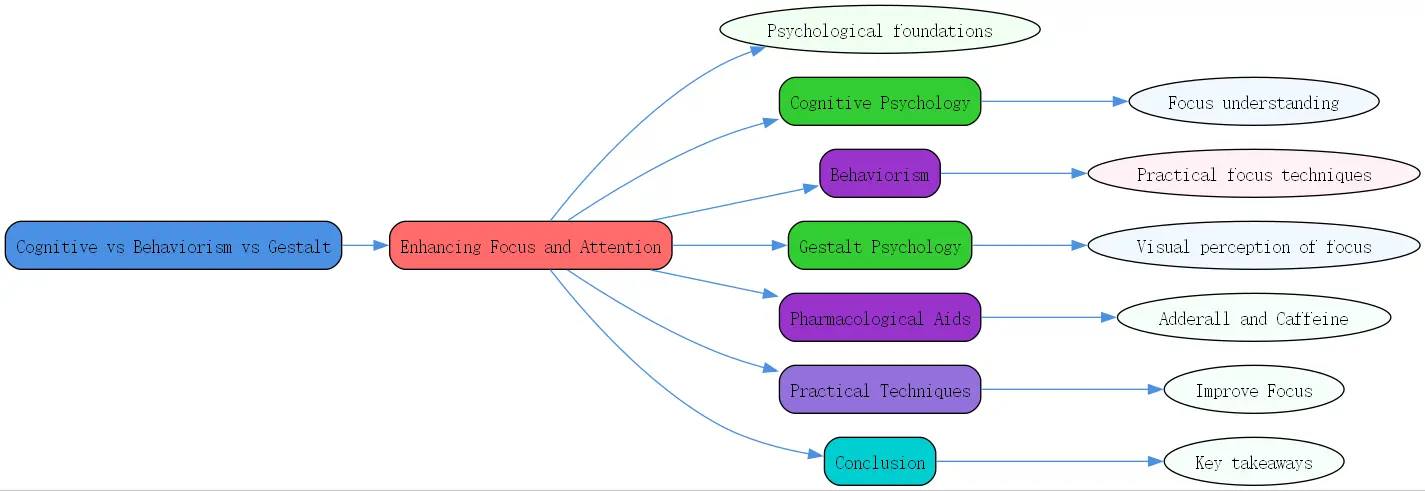Cognitive vs Behaviorism vs Gestalt Psychology: Enhancing Focus and Attention

In today’s fast-paced world, the ability to maintain sharp focus is more crucial than ever. Understanding the psychological foundations behind cognitive, behaviorism, and Gestalt theories can vastly improve how we harness this ability.
Understanding Cognitive Psychology for Focus
Cognitive psychology emphasizes the intrinsic power of one’s mental processes. An interesting aspect is how visual focus influences mental focus. By concentrating our sight onto specific details, we inherently tune our mental focus in tandem. This linkage suggests that by practicing focused visual techniques, one can enhance broader cognitive faculties.

Moreover, the role of alertness in cognitive function is paramount. Alertness, triggered by emotions or stimulants like caffeine, primes the brain for improved performance by making us more receptive to information and cognitive tasks. Understanding this can lead to more effective routines before tasks demanding high mental focus.
Improving focus through visual exercises involves simple practices like adjusting the gaze to sharpen visual acuity, thereby enhancing cognitive focus. Such exercises are grounded in cognitive practices and can significantly boost concentration levels.
Behaviorism and Focus: Practical Techniques
Behaviorism focuses on observable behaviors conditioned through environmental interactions. Applying behavioral practices for sustained focus involves using visual cues or structured environments that consistently lead to improved focus.
The impact of visual focus on behavioral outcomes is seen in how controlled visual tasks can condition the mind to enter a focused state more frequently and swiftly.
Furthermore, one can utilize visual cues to improve concentration. Structured and repetitive exposure to specific visual patterns can condition behavioral responses that underpin focused behavioral states.

Gestalt Psychology and Focus: Visual Perception
Gestalt psychology argues that the whole is greater than the sum of its parts, emphasizing our innate ability to perceive patterns and wholes. The importance of visual field and acuity plays a significant role in this approach. By harmonizing visual perception, we can boost overall cognitive focus.
Eye movements also significantly affect our focus capability. Through precise eye movements, we can control our visual and mental focus, enhancing the clarity and efficiency of cognitive processes.
Pharmacological Aids and Focus: Adderall and Caffeine
Beyond psychological approaches, pharmacological aids like Adderall and caffeine are commonly utilized to manipulate alertness and focus.
Adderall: Effects and Considerations
While Adderall vs Amphetamine shows close chemical resemblances, it’s important to note that Adderall boosts alertness primarily—not directly focus—by enhancing epinephrine release. However, its use comes with the risk of dependency and should be carefully managed, ideally under medical guidance.
Caffeine: A Safer Alternative for Alertness
Caffeine, by reducing adenosine, offers a safer alternative for enhancing alertness. It increases the epinephrine levels that help maintain alertness, proving essential for short-term focus enhancement without the significant risks posed by stronger stimulants.

Practical Techniques to Improve Focus
Visual Focus Exercises
Practitioners from BrainTalking recommend starting with practicing visual focus at a specific distance, crucial for tasks like reading or intricate work. The proximity at which one practices focus can directly translate to cognitive enhancements in similar settings.
Mindfulness and Focus
Mindfulness apps like Headspace vs Calm show varied effectiveness. Both can aid in cultivating a mentally serene environment conducive to enhanced focus. Incorporating such apps into daily routines can also address nervous vs anxious feelings, paving the way for clearer focus.
Maintaining Alertness and Reducing Distractions
Maintaining a high level of alertness can also be supported by minimizing unnecessary blinking, as frequent blinking can momentarily disrupt focus.
Conclusion
Exploring the nuances of cognitive, behaviorism, and Gestalt psychology provides a robust framework for enhancing focus and mental clarity. By integrating these psychological insights with practical techniques and pharmacological aids, individuals can vastly improve their attention and cognitive functions.




